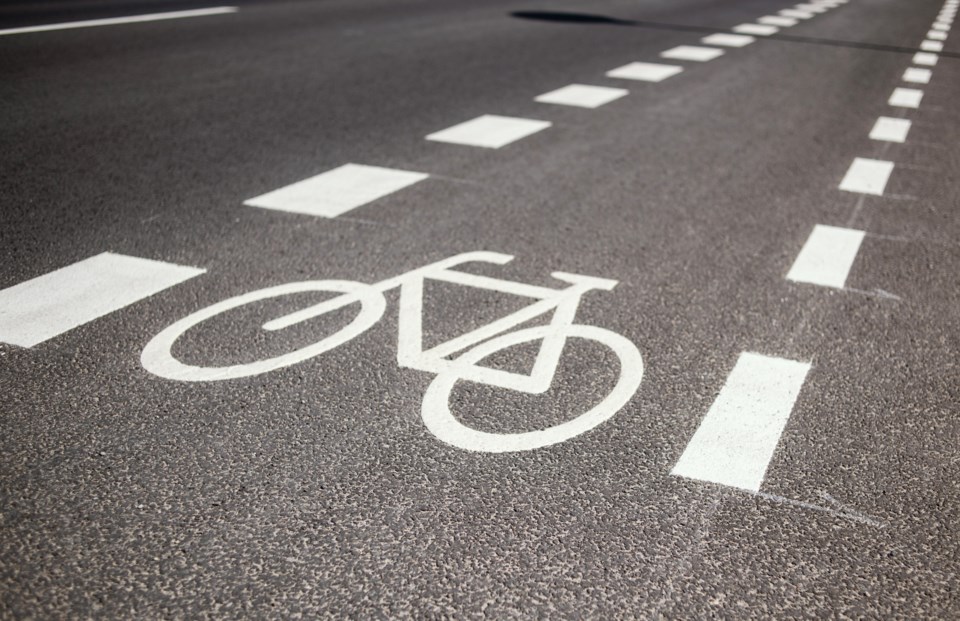Three Toronto bike lanes will live another day.
The Ontario Superior Court has granted an injunction temporarily halting the Ford government’s plans to remove the Bloor Street, Yonge Street and University Avenue bike lanes, while a judge considers whether he will allow those removals to go ahead at all.
Failing to grant an injunction “will cause more harm and inconvenience to the public interest” than allowing the government to go ahead with the removals before the Charter case is decided, Justice Paul Schabas wrote in his decision.
The injunction will last until Schabas renders a decision on a full Charter challenge against the removals, he wrote. Although the injunction was granted, the province could still appeal the decision.
Transportation Minister Prabmeet Sarkaria’s office said it would continue the design work “to begin removals as soon as possible should the decision uphold the legislation.”
“We were elected with a clear mandate to get people out of traffic by restoring driving lanes to keep some of our busiest roads moving. We intend to respect the court’s decision,” spokesperson Dakota Brasier said in a statement.
To grant an injunction, a judge must decide whether the issue is serious, whether the applicants will suffer irreparable harm if the injunction isn’t granted, and which side will suffer the greater harm if the injunction is granted or refused.
Last month, a different judge found that the issue was serious and that the applicants would suffer irreparable harm — but he denied an injunction on the basis that the applicants did not meet the “heavy burden” of convincing the court to “second-guess the wisdom” of government policy.
However, the previous judge was “very clear” that the next judge could revisit the decision, said Andrew Lewis, one of the lead lawyers for the applicants.
This time, Schabas wrote that he had “concerns about whether the removal of the targeted bike lanes will serve the public good.” He said there was evidence that the removal “will have little or no impact” on traffic congestion, despite what the government has argued.
“The applicants have provided evidence from a highly qualified transportation expert that the targeted bike lanes do not cause congestion, and that their removal will not alleviate congestion,” he wrote, adding that studies back that expert up.
“In response, the government has relied on anecdotal evidence and the opinion of a real estate management professor who does not appear to directly address the key issue of whether removal of the bike lanes will in fact alleviate congestion.”
The government also didn’t “provide a compelling basis to find that removal of these protected bike lanes will improve safety”; on the contrary, expert evidence suggests the opposite, Schabas wrote.
He also noted that if he didn’t grant the injunction, the government could simply tear out the bike lanes before his judgment — even if it doesn’t appear to be in any hurry to do so.
“Despite professing an urgent need to reduce congestion,” Schabas wrote, Ontario has given “no evidence of any plans to demolish the lanes or what would go in their place.”
Bike lane advocates, including Cycle Toronto and two individual cyclists, challenged the provincial government’s planned removal of the lanes on Bloor, Yonge and University, arguing that doing so would violate the Charter's guarantee to life and security of the person.
Cycle Toronto executive director Michael Longfield said he felt confident about the Charter challenge, especially given how “skeptical” Schabas has seemed of the Crown’s arguments.
“Ripping out these bike lanes won’t solve traffic congestion, and it will put people's lives at risk, and the province has not put any evidence forward at any stage of this, publicly or privately, of anything otherwise,” he said.
“It’s a legal victory today, and I think it's also a moral victory for everyone who cares about a more sustainable and healthier Toronto,” he said.
Schabas grilled the province’s lawyers last week on whether the removals were “arbitrary” — and thus potentially in violation of the Charter — and whether they bore any relation to the government’s stated goal of easing traffic congestion.
The bike lanes along the three major roads have been at the centre of a political firestorm since October, when the Ford government threatened their removal with Bill 212, the Reducing Gridlock, Saving You Time Act.
The law directs the removal of bike lanes on Bloor Street, Yonge Street and University Avenue and requires municipalities to ask for provincial permission to install a bike lane when it would remove a traffic lane for cars.
Cycle Toronto challenged the law in December. The applicants only challenged the removal of the three Toronto bike lanes, not the other parts of the bill — meaning that even if they are successful, municipalities will still have to get provincial approval for new lanes.
As the issue has dragged on for months, the province has softened its hardline stance.
In early April, Sarkaria and Toronto Mayor Olivia Chow teased a potential compromise.
“There are lots of discussions regarding a solution that could accommodate an extra car lane but protect the safe space for cycling,” Chow said on April 8.
Later that day, Sarkaria’s spokesperson said the province is willing to work with the city to fit both car and bike lanes onto the same street, so long as the city foots the bill.
“Where both a reinstated car lane and a bike lane can exist, we are open to collaboration with the city of Toronto, provided they fund their portion of their identified infrastructure needs,” Braiser said.
Longfield said those conversations should be paused.
“Because, ultimately, the compromise itself still isn't going to achieve what it is the province is looking for, which is a solution to address traffic congestion,” he said.
This story was updated after publication with comment from the transportation minister’s office.




